|
|
|
Sort Order |
|
|
|
Items / Page
|
|
|
|
|
|
|
| Srl | Item |
| 1 |
ID:
192960
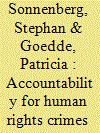

|
|
|
|
|
| Summary/Abstract |
This article explores how claims alleging serious human rights violations or breaches of international criminal law that occurred in the Democratic People's Republic of Korea (DPRK or North Korea) might unfold in the courts of the Republic of Korea (ROK or South Korea) under various differing jurisdictional theories. South Korea has legislation allowing for the exercise of universal jurisdiction, an increasingly widespread judicial mechanism for a national court to hold alleged perpetrators of serious human rights and humanitarian law violations accountable for their actions regardless of where the crime was committed and regardless of the victim's or the perpetrator's nationality. In South Korea, domestic criminal and civil jurisdiction can conceivably be "stretched" to encompass crimes perpetrated on the northern half of the Korean peninsula due to a constitutional provision that denies the existence of a separate North Korean sovereign nation. This article introduces and compares the feasibility and challenges of various jurisdictional approaches in South Korea that could address human rights crimes in North Korea, specifically (a) universal jurisdiction prosecution based on domestic law, (b) domestic criminal prosecution, and (c) civil cases in tort.
|
|
|
|
|
|
|
|
|
|
|
|
|
|
|
|
| 2 |
ID:
142271
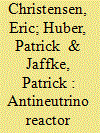

|
|
|
|
|
| Summary/Abstract |
In this article a case study of the application of antineutrino safeguards to a real-world scenario, the North Korean nuclear crisis in 1994, is presented. Detection limits to a partial or full core discharge in 1989 based on actual IAEA safeguards access are derived and it is found that two independent methods would have yielded positive evidence for a second core with very high confidence. To generalize these results, detailed estimates for the sensitivity to the plutonium content of various types of reactors, including most types of plutonium production reactors, are presented, based on detailed reactor simulations. A key finding of this study is that a wide class of reactors with a thermal power of 0.1–1 gigawatt can be safeguarded achieving IAEA goals for quantitative sensitivity and timeliness with antineutrino detectors adjacent to the reactor building. Antineutrino reactor monitoring does not rely on the continuity of knowledge and provides information about core inventory and power status in a timely fashion. The necessary detection systems do not exist yet but are expected to become available within two to five years.
|
|
|
|
|
|
|
|
|
|
|
|
|
|
|
|
| 3 |
ID:
169152
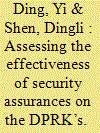

|
|
|
|
|
| Summary/Abstract |
In the Democratic People’s Republic of Korea (DPRK)’s case of nuclear
proliferation, less attention has been paid to the role of security assurances. This
paper seeks to assess the role of security assurances for the DPRK provided by the
UN, the Soviet Union, China, and the United States and to figure out why these
assurances are less effective to bridle its nuclear ambition. It argues that an effective
security assurance for nuclear non-proliferation should meet at least two conditions.
Firstly the security assurance should be credible, which can be realized by being
publicized, legally binding, and infusing with further commitments. Secondly, the
security assurance tailored to the unique features of the target state’s concerns is
more likely to be effective. Using this set of criteria, the only moderately effective
assurance is that provided by the Soviet Union. The general security assurance
of the UN is neither legally binding nor specifically targeted. The alliance with
China exists only on paper as Pyongyang believes Beijing is reluctant to fulfill its
obligation as an ally. The United States is taking a capricious attitude on the DPRK
and none of its security assurances are legalized or address its major concern of
regime survival. These may help explain why security assurances failed to prevent
the DPRK from acquiring nuclear weapons.
|
|
|
|
|
|
|
|
|
|
|
|
|
|
|
|
| 4 |
ID:
171000
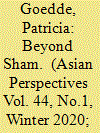

|
|
|
|
|
| Summary/Abstract |
The Constitution of the Democratic People's Republic of Korea is often dismissed as a valid legal instrument within the larger framework of the North Korean legal system. This is an unsurprising outcome given the portrayal of North Korea as a totalitarian dictatorship, documented human rights abuses, and the lack of access to the country's lawmaking processes. It is also a foreseeable result if comparisons are made to liberal democratic constitutions where rights guarantees and judicial review are defining elements. However, the North Korean Constitution deserves more nuanced scrutiny in light of evolving research on socialist and authoritarian constitutionalism in Asia. This article argues that the DPRK Constitution should be included more substantively within the analytical frameworks of Asian, socialist, and authoritarian constitutionalism by virtue of how it functions to nation-build, legitimate institutional leadership, signal ideological shifts, regulate society on collectivist, duty-based principles, and guide economic reforms for development and modernization.
|
|
|
|
|
|
|
|
|
|
|
|
|
|
|
|
| 5 |
ID:
151198
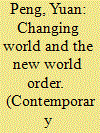

|
|
|
|
|
| Summary/Abstract |
Believe it or not, the world has changed not due to worldwide wars but in a reformative, progressive, inconspicuous way. Though there is no clear-cut division between quantitative change and the qualitative one, after the alternations of the Westphalian System, the Versailles-Washington System and the Yalta System, world order is being restructured for a fourth time, a historical moment unprecedented in the last 400 years. Dramatic, at times devastating, changes of order were once linked to globe-wide wars (hot or cold), but the current change in world order stems from regional conflicts such as those in Afghanistan, Iraq and elsewhere, nuclear crises in the DPRK and Iran, the Ukraine crisis, and friction over East China and South China seas. Rising new economies, sluggish Western economies with changing demographics, emerging non-state actors, and interlocking problems contest theWest’s leadership of the international system.
|
|
|
|
|
|
|
|
|
|
|
|
|
|
|
|
| 6 |
ID:
099685
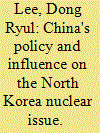

|
|
|
|
|
| Publication |
2010.
|
| Summary/Abstract |
China is the largest trading partner of the Democratic People's Republic of Korea (DPRK) and also provides considerable economic aid. Thus, China is said to have very strong economic leverage over North Korea. China's goal in its North Korea policy is to secure political and economic stability in the region peripheral to China by using such economic leverage. To achieve this goal, China is expected to approach the North Korea nuclear issue with a more comprehensive and longer-term viewpoint. China seeks to stably manage the North Korea nuclear issue by utilizing its economic leverage over North Korea in the short- to medium-term. China thinks that such management, through the Six-Party Talks, is the most appropriate solution to the North Korea nuclear issue as far as China is concerned. In the long term, China seeks to transplant its reform and open-door model into North Korea and to structurally soft-land North Korea as a China-friendly regime in the region that adjoins the northeastern border of China. If China determines that the North Korea nuclear issue will not lead to any serious insecurity directly affecting China, it is very likely that China will choose the method of managing the North Korea nuclear issue from a long-term perspective. To achieve such a long-term strategy, China must maintain its economic exchange and cooperation with North Korea, and not use it as a means to sanction North Korea.
|
|
|
|
|
|
|
|
|
|
|
|
|
|
|
|
| 7 |
ID:
138344
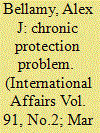

|
|
|
|
|
| Summary/Abstract |
The Democratic Peoples' Republic of Korea (DPRK) is arguably the world's most chronic abuser of human rights. In an unprecedented move, a Commission of Inquiry established by the UN's Human Rights Council accused the DPRK government of systematic violations of human rights amounting to crimes against humanity. In so doing, the Commission succeeded in putting human rights in the DPRK on the global agenda. Within months the UN's General Assembly and Security Council had joined the human rights body in examining the issue. This article explains the emergence of this new engagement with human rights in the DPRK, showing its relation to the ‘Responsibility to Protect’ principle. It charts the growing sense of frustration felt at the lack of progress on human rights in DPRK and shows how this was manifested in the General Assembly's decision to pursue the Commission's recommendations and call on the Security Council to take concrete steps. Despite this, however, the article shows that there are powerful obstacles in the way of a more robust international approach to human rights in the DPRK and counsels a less confrontational approach focused on engaging China and building trust within the Security Council.
|
|
|
|
|
|
|
|
|
|
|
|
|
|
|
|
| 8 |
ID:
127769
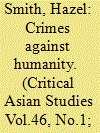

|
|
|
|
|
| Publication |
2014.
|
| Summary/Abstract |
The United Nations Human Rights Council (UNHRC) Commission of Inquiry, established in 2013 to investigate human rights violations in North Korea, identified food rights violations, among other abuses, as potentially constituting crimes against humanity. A contradiction arises in that UNHRC claims of food rights violations in the DPRK are not congruent with the statistical indicators emanating from the UN humanitarian and development agencies that have worked in the DPRK since the mid 1990s and that have engaged in and published substantial research on food, nutrition, and health. The author of this article contends that North Korea has an oppressive government and argues that the lack of transparency makes the many things that are unknown about North Korea, especially its opaque penal system, of legitimate ethical and political concern. Reasonably good data on issues pertaining to social and economic rights do exist, however, as this article shows. The inconsistency between the received wisdom on food and nutrition is of concern because the potential consequences of a state being judged as committing crimes against humanity include military intervention and consequent threats to life for millions. This article reconsiders how and why the received wisdom becomes unchallenged and unchallengeable in scholarly, policy, and media discourse. Inconsistency and misrepresentation is not primarily due to conscious bias but much more because of the unconscious adoption of a securitized perspective through which knowledge about North Korea is filtered. The article argues for reframing North Korean human rights issues on the basis that North Korean society is neither unique nor unknowable.
|
|
|
|
|
|
|
|
|
|
|
|
|
|
|
|
| 9 |
ID:
092611
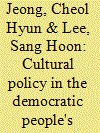

|
|
|
|
|
| Publication |
2009.
|
| Summary/Abstract |
The purpose of this paper is to introduce North Korean culture as well as its foundation, North Korean cultural policy. The paper consists of three broad sections. First, I explore the unique qualities and changes of North Korean cultural policy. Next, I look into what North Korea considers to be culture and how it is portrayed. Finally, I will analyze the similarities and differences between North and South Korean cultural policy, and the possibility of their convergence.
|
|
|
|
|
|
|
|
|
|
|
|
|
|
|
|
| 10 |
ID:
161056
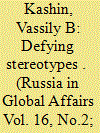

|
|
|
|
|
| Summary/Abstract |
n this article the author probes into how the Democratic People’s Republic of Korea and its political regime managed to survive in defiance of internal economic problems and external political, economic and military pressures it experienced since 1991. Comparison of the available statistics illustrating North Korea’s economic and internal political situation, as well as pressure methods and tactics used on a smaller scale against a far stronger country, the Soviet Union, during the Cold War, allows for taking a fresh look at the effectiveness of foreign policy instruments the United States created during its confrontation with the Soviet Union. Consolidation of the country’s ruling elite amid foreign pressures and exposure to external threats are identified as factors that play the decisive role in determining the outcome of the standoff. The effectiveness of pressure strategies apparently depends on this factor
|
|
|
|
|
|
|
|
|
|
|
|
|
|
|
|
| 11 |
ID:
196085


|
|
|
|
|
| Summary/Abstract |
Although the Democratic People’s Republic of Korea’s (DPRK) nuclear program has been a challenge to international security for three decades, the world still knows little about its nuclear intentions. A recently available dataset of Korean Central News Agency’s English publications (1997–2018) provides a complete coverage of DPRK’s nuclear activities in the time span. Our study employs the Louvain method of community detection in large networks to detect patterns and trends in North Korea’s nuclear rhetoric. We have two findings: Pyongyang’s primary objective is deterrence, although it also utilizes nuclear development to boost regime legitimacy. This secondary intention of legitimization is more prominent under Kim Jong-un than under Kim Jong-il, but still not as salient as deterrence. Our results suggest a policy approach of engagement and deterrence.
|
|
|
|
|
|
|
|
|
|
|
|
|
|
|
|
| 12 |
ID:
148637
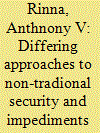

|
|
|
| 13 |
ID:
114051
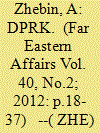

|
|
|
|
|
| Publication |
2012.
|
| Summary/Abstract |
Much attention has been paid to the development of political processes in the country prior and after the sudden death of Kim Jong-il in December 2011, including the transfer of power to the new leader Kim Jong-un, and also to the situation within the ruling elite. This article also examines the DPRK's relations with Russia, China, the United States, the Republic of Korea, and certain other countries, as well as the influence of the events in Libya on the prospects of resolving the nuclear problem of the Korean Peninsula.
|
|
|
|
|
|
|
|
|
|
|
|
|
|
|
|
| 14 |
ID:
100724
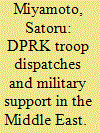

|
|
|
|
|
| Publication |
2010.
|
| Summary/Abstract |
The DPRK now trades in arms with the Middle East. However, in the October War (1973) the DPRK first began military cooperation with the Middle East by sending troops and providing unrequited military support. This switch was made to win support within the UN from these Middle Eastern countries, and so to counteract the US presence in the UN. Failing this, the DPRK withdrew from the UN in 1976. The DPRK then turned to arms trading both to build up its foreign currency reserves and to help liberate developing countries from US control.
|
|
|
|
|
|
|
|
|
|
|
|
|
|
|
|
| 15 |
ID:
160672


|
|
|
|
|
| Summary/Abstract |
North Korea's engagement in the Middle East is a six-decade long narrative. Neither the DPRK nor its Middle Eastern partners have remained still over this time; each region has undergone significant changes. In particular, the leadership of the North Korea is now in the hands of the third generation. No matter how stagnant and monolithic the country may seem at first sight, each generation has had to deal with differing commitments and adapt to changing realities. As such, each generational change of leadership in Pyongyang has arguably had repercussions on the DPRK's relationship Middle Eastern partners, which may at times have been misattributed to a fundamental change of approach. This study attempts, therefore, to probe the twists and turns in the DPRK's interactions with the Middle East since the death of Kim Il-sung, beginning with an appraisal of each leaderships’ priorities in North Korea, and how they could potentially influence Pyongyang's overall orientation toward its different partners in the region.
|
|
|
|
|
|
|
|
|
|
|
|
|
|
|
|
| 16 |
ID:
104302
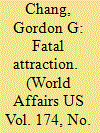

|
|
|
|
|
| Publication |
2011.
|
| Summary/Abstract |
At the beginning of 2011, Beijing repeatedly denied rumors that it was planning to send troops to North Korea. "Totally groundless," said Foreign Ministry spokesman Hong Lei, referring to reports in South Korean media that China had been holding discussions with the Democratic People's Republic of Korea about stationing of Chinese forces in the northeastern port of Rason. "China will not send a single soldier to other countries without the approval of the UN," the Defense Ministry said to the Global Times, a Communist Party-run paper.The denial was necessitated by South Korea's broadsheets, which had been carrying stories for months that Beijing was negotiating the entry of the People's Liberation Army into the DPRK, as the Kim family regime calls itself. In the most dramatic of the articles, the Chosun Ilbo reported in mid-January that sources said Chinese forces were already in North Korea. In the east, the reports stated, some fifty armored vehicles and tanks crossed the Tumen River at night about thirty miles from Rason in the middle of December. In the west, PLA jeeps in Dandong were seen heading to the North Korean city of Sinuiju, just south of the Yalu River, at about the same moment. If true, China's troops are back in the North for the first time since 1994, when they withdrew from Panmunjom, the truce village in the Demilitarized Zone
|
|
|
|
|
|
|
|
|
|
|
|
|
|
|
|
| 17 |
ID:
122129
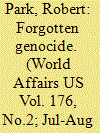

|
|
|
|
|
| Publication |
2013.
|
| Summary/Abstract |
North Korea's nuclear weapons test on February 12th was its third and most powerful to date. According to the Democratic People's Republic of Korea's state-controlled news agency, the test was carried out "using a miniaturized and lighter nuclear device with greater explosive force than previously." It was a wake-up call for some in the arms control community who have dismissed Pyongyang's nuclearization merely as a bargaining chip for monetary or material concessions and against regime change. The North Koreans are now playing in the big leagues, with a warhead small enough to be used on an intercontinental ballistic missile that, according to the regime, could potentially strike not only US bases in South Korea and Japan, but also Guam and the US mainland. Those who ritualistically condemned the test also ignored one of the issues that it was meant to obscure: while spending billions on its nuclear program, the Kim regime, in continuity with its dynastic predecessors, was also presiding over a state-induced famine and mass atrocities within its prison camp system that have taken on the proportions of a homemade genocide.
|
|
|
|
|
|
|
|
|
|
|
|
|
|
|
|
| 18 |
ID:
165777
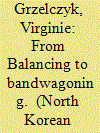

|
|
|
|
|
| Summary/Abstract |
Article Type: Research Paper Purpose—The DPRK has maintained an extensive array of foreign relationships over the past decades, both for political and economic gains. This article evaluates the impact of the current sanction regime on the DPRK's activities with African countries. Design/Methodology/Approach—The analysis is conducted by using a bespoke behavior framework based on Stephen Walt's "balance of threat" theory. This framework develops the concepts of balancing, defensive bandwagoning, and opportunistic bandwagoning as potential behaviors of African states following the imposition of United Nations Security Council Resolutions to sanction North Korea from 2006 until 2017. Findings—Evidence suggests that some long-standing relationships based on military and economic cooperation have been severed in recent years; thus, it supports a general balancing behavior. Findings also suggest that a specific group of countries subscribe to new opportunistic and defensive bandwagoning by embarking on talks and partnerships in the fields of health and science, regardless of the sanction regime, signaling defiance against a Western-led world order. Practical Implications—Patterns of rapprochements between North and South Korea and between North Korea and the United States have large implications for the potential removal of UNSCRs that paralyze North Korean foreign relations and slow its potential development. A clearer understanding of the DPRK's economic and market networks abroad, as well as potential political allies, can help differentiate between legitimate activities and illegal ones. hence, it allows a more informed approach to engage with the DPRK. Originality/Value—The article looks at the DPRK's relationships with countries that have often been ignored because they were not seen as important, given that North Korea was never expected to be successful in developing advanced military and nuclear technology. It is original as it looks at declassified official documents, official economic and military trade records and news archives, and presents an encompassing analysis of 51 African countries' relationships with the DPRK over time. The results of the study are valuable as they add to the understanding of the DPRK's foreign policy behavior, which is important given its potential nuclear status.
|
|
|
|
|
|
|
|
|
|
|
|
|
|
|
|
| 19 |
ID:
116680
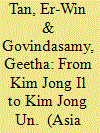

|
|
|
|
|
| Publication |
2012.
|
| Summary/Abstract |
The recent death of Kim Jong Il and the succession of his son, Kim Jong Un, as Supreme Leader of the Democratic People's Republic of Korea leaves the Northeast Asian region at a crossroads. Given the younger Kim's lack of political experience, it is reasonable to believe that his priority will be on consolidation of his political and military power base in Pyongyang. More recently, the Democratic People's Republic of Korea (DPRK) has sent mixed signals with regard to its intentions. On the one hand, North Korea has agreed to a moratorium of its nuclear activities and has even invited the IAEA to inspect its nuclear facilities; at the same time, however, the DPRK has also announced its plan to launch a satellite in mid-April, using technology derived from the Taepodong missile. Set against this backdrop, we underline and comparatively assess the importance of the USA, the Republic of Korea, and China, all of which will be going through a political transition in 2012. We conclude that Seoul and Beijing are in the best position to reopen the process of dialogue with the DPRK.
|
|
|
|
|
|
|
|
|
|
|
|
|
|
|
|
| 20 |
ID:
117662
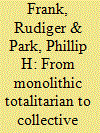

|
|
|
|
|
|
|
|